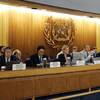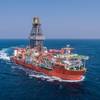IMO Kicks-Start GloFouling Project
International Maritime Organization (IMO), the UN body, announced that a major five-year project to help protect marine biodiversity has been kick-started at a global workshop at IMO Headquarters in London, United Kingdom (18-20 March).
The IMO-executed GloFouling Partnerships project will address bioinvasions by organisms which can build up on ships’ hulls and other marine structures. The project is a collaboration between the Global Environment Facility (GEF), the United Nations Development Programme (UNDP) and IMO.
Representatives from 12 lead partnering countries, four regional organizations, IOC-UNESCO, the World Ocean Council and numerous strategic partners attended its first Global Project Task Force meeting for the GloFouling Partnerships project -
“This milestone event marks the real start of this exciting project, the first-ever globally coordinated effort to address biofouling - not just from shipping, but from all marine sectors,” said Jose Matheickal, representing IMO’s Marine Environment Division.
National administrations and regional IGOs will work with the project to analyse their needs and develop baseline and economic assessments that will help decision makers draft new policies or action plans to implement the Biofouling Guidelines issued by the International Maritime Organization (IMO) in 2011. To support this process, the project will manage demonstration sites, provide institutional capacity building and develop awareness-raising campaigns geared to all relevant maritime industries, including recreational boating.
The introduction of invasive aquatic organisms into new marine environments not only affects biodiversity and ecosystem health, but also has measurable adverse effects on a number of economic sectors such as fisheries, aquaculture and ocean energy. Addressing invasive aquatic species is not only a matter of ensuring the health and integrity of marine ecosystems, but ultimately about safeguarding ecosystem services that sustain the livelihoods of coastal communities across the globe. The GloFouling project will help meet a number of UN Sustainable Development Goals (SDGS), including SDG 14 on the oceans.
The London meeting heard status reports from the lead partnering countries, regional coordinating organizations and strategic partners. Discussions centred on shipping and also on other marine sectors such as ocean-based renewable energies, aquaculture, offshore structures and recreational activities, including sailing.
Participants exchanged views on some of the latest initiatives at the regional and global level related to biofouling and invasive aquatic species, notably World Sailing’s Sustainability Agenda, the work of the EU’s COMPLETE Project, BIMCO’s plan for an in-water cleaning standard and BioFREE, a collaboration between Heriot-Watt University and the European Marine Energy Centre at the Orkney Islands testbed.
The work plan for the project was discussed in detail, with special attention paid to the schedule of activities, the development of a communication strategy to promote awareness of the issue of invasive aquatics species and the best strategy for securing participation from the private sector - to help overcome some of the barriers that have been identified to the adoption of new technologies.
The twelve countries spearheading the work of the GloFouling project represent a mix of developing nations and Small Island Developing States: Brazil, Ecuador, Fiji, Indonesia, Jordan, Madagascar, Mauritius, Mexico, Peru, the Philippines, Sri Lanka and Tonga. Australia, Canada, Germany, New Zealand and Sweden also contribute to the project as strategic partners.










